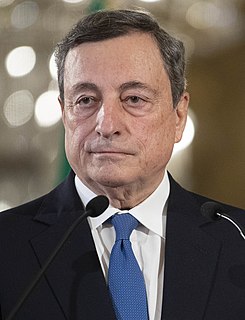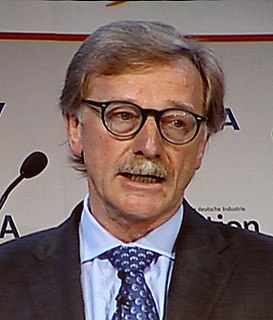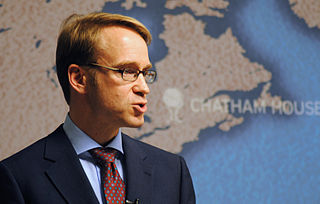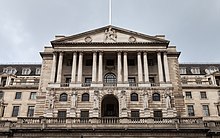
The European Central Bank (ECB) is the prime component of the Eurosystem and the European System of Central Banks (ESCB) as well as one of seven institutions of the European Union. It is one of the world's most important central banks.

The eurozone, officially called the euro area, is a monetary union of 19 member states of the European Union (EU) that have adopted the euro (€) as their primary currency and sole legal tender. The monetary authority of the eurozone is the Eurosystem. Eight members of the European Union continue to use their own national currencies, although most of them have agreed to adopt the euro in the future.

Jean-Claude Trichet is a French economist who served as President of the European Central Bank from 2003 to 2011. Previous to his assumption of the presidency he served as Governor of the Bank of France from 1993 to 2003 under presidents François Mitterrand and Jacques Chirac.

Erkki Antero Liikanen is a Finnish social democratic politician and a former Governor of the Bank of Finland.

The president of the European Central Bank is the head of the European Central Bank (ECB), the main institution responsible for the management of the euro and monetary policy in the Eurozone of the European Union (EU).
The Harmonised Index of Consumer Prices (HICP) is an indicator of inflation and price stability for the European Central Bank (ECB). It is a consumer price index which is compiled according to a methodology that has been harmonised across EU countries. The euro area HICP is a weighted average of price indices of member states who have adopted the euro. The primary goal of the ECB is to maintain price stability, defined as keeping the year on year increase HICP below but close to 2% for the medium term. In order to do that, the ECB can control the short-term interest rate through Eonia, the European overnight index average, which affects market expectations. The HICP is also used to assess the convergence criteria on inflation which countries must fulfill in order to adopt the euro. In the United Kingdom, the HICP is called the CPI and is used to set the inflation target of the Bank of England.
The Group of Thirty, often abbreviated to G30, is an international body of financiers and academics which aims to deepen understanding of economic and financial issues and to examine consequences of decisions made in the public and private sectors. Areas within the interest of the group include: the foreign exchange market, international capital markets, international financial institutions, central banks and their supervision of financial services and markets, and macroeconomic issues such as product and labor markets.

Helicopter money is a proposed unconventional monetary policy, sometimes suggested as an alternative to quantitative easing (QE) when the economy is in a liquidity trap. Although the original idea of helicopter money describes central banks making payments directly to individuals, economists have used the term 'helicopter money' to refer to a wide range of different policy ideas, including the 'permanent' monetization of budget deficits – with the additional element of attempting to shock beliefs about future inflation or nominal GDP growth, in order to change expectations. A second set of policies, closer to the original description of helicopter money, and more innovative in the context of monetary history, involves the central bank making direct transfers to the private sector financed with base money, without the direct involvement of fiscal authorities. This has also been called a citizens' dividend or a distribution of future seigniorage.

Mario Draghi is an Italian economist, banker, academic and civil servant who has been Prime Minister of Italy since 13 February 2021. He previously served as President of the European Central Bank (ECB) from 2011 until 2019. Draghi was also Chair of the Financial Stability Board from 2009 to 2011 and Governor of the Bank of Italy from 2006 to 2011.

Quantitative easing (QE) is a monetary policy whereby a central bank purchases predetermined amounts of government bonds or other financial assets in order to inject money into the economy to expand economic activity. Quantitative easing is an unconventional form of monetary policy, which is usually used when inflation is very low or negative, and when standard monetary policy instruments have become ineffective. Quantitative tightening (QT) does the opposite, where for monetary policy reasons, a central bank sells off some portion of its own held or previously purchased government bonds or other financial assets, to a mix of commercial banks and other financial institutions, usually after periods of their own, earlier, Quantitative Easing purchases.

José M. González-Páramo is a Spanish economist who served as a member of the Executive Board of the European Central Bank (ECB) from 2004 until 2012.

Yves Mersch is a Luxembourgish jurist and lawyer who served as Governor of the Central Bank of Luxembourg from the bank's formation in 1998 until 2012, and as a member of the Executive Board of the European Central Bank from 2012 until 2020.
Athanasios Orphanides is a Cypriot economist who served as Governor of the Central Bank of Cyprus between 3 May 2007 to 2 May 2012 and as a member of the Governing Council of the European Central Bank between 1 January 2008 and 2 May 2012.

Jens Weidmann is a German economist who served as president of the Deutsche Bundesbank between 2011 and 2021. He also served as chairman of the Board of the Bank for International Settlements.

Peter Praet was executive board member and chief economist of the European Central Bank.

Andrea Enria an Italian economist who currently serves as Chair of the European Central Bank's Supervisory Board, as of 1 January 2019. He previously served as the chairperson of the European Banking Authority (EBA) between 2011 and 2019.

Benoît Georges Cœuré is a French economist who served on the Executive Board of the European Central Bank (ECB) from 2012 until 2019. He has been President of the Autorité de la concurence since January 2022.
Outright Monetary Transactions ("OMT") is a program of the European Central Bank under which the bank makes purchases in secondary, sovereign bond markets, under certain conditions, of bonds issued by Eurozone member-states. The program was presented by its supporters as a principal manifestation of Mario Draghi's commitment to do "whatever it takes" to preserve the euro.

Sabine Lautenschläger is a German jurist who previously served as a member of the executive board of the European Central Bank. She was formerly vice-president of the Deutsche Bundesbank. Lautenschläger graduated with a Staatsexamen from the University of Bonn in 1990.
Dual interest rates refers to a policy implemented by central banks which aims to influence lending rates independently of deposit rates as a means of stimulating economic activity. Policies similar to this have long been a feature of Chinese monetary policy. More recently dual interest rates have been introduced by the European Central Bank (ECB), under its TLTRO II scheme as an unconventional monetary policy. More aggressive use of these policies has been suggested as an effective alternative to negative interest rates, quantitative easing (QE) and forward guidance.















